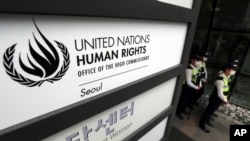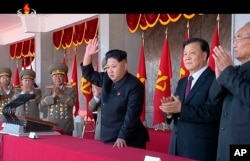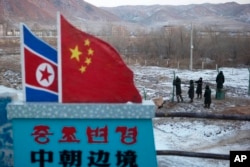China and Russia may not be able to prevent the United States from calling a meeting of the United Nations Security Council on human rights in North Korea this week, but they are expected to stop it from passing any punitive resolutions.
The Security Council is made up of five permanent members with veto rights: the United States, China, Russia, France, and Britain; as well as 10 non-permanent members elected for two-year terms.
UN resolution
Last year the 193-member U.N. General Assembly voted to send to the Security Council a resolution to refer North Korea to the International Criminal Court based on a U.N. Commission of Inquiry that documented its network of political prisons and widespread human violations that include torture, enslavement, rape and murder.
The Security Council debated the measure but declined to call a vote given the near certainty that North Korea’s allies Russia and China would veto it.
However once the Security Council puts an issue in its agenda, that issue can be brought up again at any time.
The U.S., which this month holds the presidency of the Council, set a special meeting for Thursday to revisit this issue.
China has reportedly objected to the meeting, arguing that it is beyond the scope of the peace and security mandate of the Council.
Russia supposedly voiced a procedural complaint, saying the matter should have been raised at a prior session earlier this month.
Eight other council members supported the U.S. decision to put the issue on agenda - Chile, France, Jordan, Lithuania, Malaysia, New Zealand, Spain, and Britain.
It is unlikely that at Thursday’s meeting China and Russia will agree to support the resolution to refer North Korea to the International Criminal Court.
Keeping up the pressure
Phil Robertson, deputy director of Human Rights Watch’s Asia division, said it is important to keep this issue alive at the highest levels of the U.N. as a way to pressure North Korea to end systematic human rights violations and hold its leaders accountable for past abuse.
“Any sort of mention of human rights of North Korea at the U.N. Security Council immediately sets off alarm bells in Pyongyang and that is how it should be. We want to continue to hold their feet to the fire,” said Robertson.
Inter-Korean progress
While pressure builds against Pyongyang at the U.N., inter-Korean tensions have been easing somewhat after a border incident nearly escalated into a large-scale military conflict in August.
In the last few months Pyongyang has exhibited uncharacteristic restraint, cooperating with Seoul to host separated families reunions and not following through on threats to launch a long-range rocket or a nuclear test.
This week the two Koreas will hold high-level talks for the first time in years to improve relations. They are expected to discuss setting up regular reunions for separated families and resuming tourism to the North’s Mount Kumgang resort that was suspended in 2008 after a South Korean tourist was shot and killed by North Korean soldiers.
There are also signs Sino-North Korea relations, that deteriorated after North Korea conducted its third nuclear test in 2013, are also on the mend. Chinese President Xi Jinping in September sent a high-level delegation to North Korea’s founding party anniversary celebration. There are reports of expanded economic development at the China, North Korea border. And officials in Seoul said that Beijing has been of late a moderating influence on Pyongyang.
Proponents for trying to change North Korea through engagement, especially when Pyongyang is being cooperative, have voiced reservations that U.N. efforts could undermine other political progress being made.
“You can’t give up the human rights campaign. At the same time you have to recognize that there are smart ways of advancing human rights goals, and then there are purely rhetorical morally satisfying ways that don’t actually improve the situation on the ground,” said Professor John Delury, a North Korea analyst at Yonsei University in Seoul.
Human Rights Watch advocate Robertson says holding North Korea accountable for its ongoing human rights violations should not be a negotiable item that can dropped to achieve political progress or even to get a deal to limit the country’s nuclear program.
“To assume that every time a discussion on human rights takes place at the U.N. that this is going to set back inter-Korean relations is to fall into North Korea’s trap. And the trap is that no one should discuss human rights or we’ll get angry,” he said.
North Korea has denied allegations of systematic human rights abuses, saying such charges are part of a U.S.-led plot to destabilize the country.


